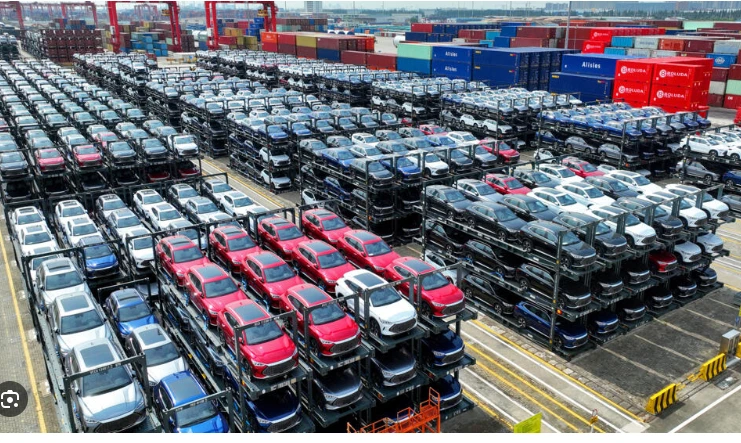Global car giants seek tech allies in China's cutthroat EV market

Stay tuned with 24 News HD Android App

Struggling foreign automakers in China are looking for help from local tech giants to try to stay competitive in the world's biggest electric car market, where shiny smart screens, assisted driving and sophisticated map technology are in high demand.
At the recent Beijing Auto Show, China's biggest car expo, a number of foreign firms announced tech partnerships -- from Nissan joining forces with Baidu to Toyota signing a cooperation agreement with Tencent.
The two Japanese companies are among a number of traditional auto juggernauts, once dominant in China, that are now struggling to keep pace with a new generation of local EV startups.
"They are notoriously conservative companies and their competencies aren't technology," Tu Le, managing director of Sino Auto Insights, told AFP.
"They've tried to invest in frontier technology for the automotive space but it doesn't come naturally," he said.
"But they are being forced to try to be more open-minded towards technology due to where the market is moving in China and the new entrants into the space -- companies like Xiaomi and Huawei with high tech consumer products backgrounds."
Those firms are now in a brutal price war with more than 100 Chinese electric car brands, all fighting to offer the most attractive prices and the most advanced tech to wealthier consumers.
As a result, foreign firms have suffered, Gregor Sebastian, a senior analyst and EV industry expert with the Rhodium Group, an independent research firm, told AFP.
"Foreign car makers in China in general, but particularly Japanese car makers, have really been... hammered in the last 12 to 18 months in the Chinese market," he said.
"They've lost market share rapidly... This is linked to intense Chinese competition from producers like BYD, but also the numerous EV startups."
BYD, which has emerged in recent years as the country's undisputed champion of the sector, beat Tesla in the final quarter of 2023 in global EV sales.
- 'Walled garden' -
Foreign automakers are now compelled to find ways to boost their standing in a market increasingly dominated by a low-cost and high-tech vehicle lineup.
Smart technology features are among the new set of requirements for obtaining a leading edge in China's EV race.
But as the US-China geopolitical competition has intensified in recent years, Beijing has tightened control over foreign firms' access to information it considers sensitive, such as advanced and the heaps of data produced by domestic cars.
One major reason why foreign automakers are seeking partnerships with local tech firms is to benefit from their innovation, which Chinese automaking executives have attributed to the cutthroat competition in the industry.
But another is access to data.
"There is a bit of a walled garden scenario going on here," Daniel Kollar, head of automotive and mobility at the consultancy Intralink, told AFP.
"China wants to be seen as playing by the rules, letting foreign players access the market," he said.
"But they really don't want to give up on the security side of things."
The solution is to work with a Chinese partner.
"If you want to offer highly advanced mapping solutions in China, you need to work with a local company and either licence their mapping data or enter into a joint venture," Sebastian told AFP.
- Eye on the future -
Nissan has hailed its deal with Baidu as allowing it to bring "exciting intelligence system(s) and AI-based services to customers in China and beyond".
And Toyota said its deal with gaming giant Tencent on AI would help it capitalise on Chinese consumers' growing appetite for advanced smart features in the cars it sells in China.
Baidu has also recently started collaborating with South Korean automotive giant Hyundai and its affiliate Kia.
These Chinese firms are the "experts" in precisely the space where foreign firms are falling behind, Sino Auto Insights' Tu Le said.
"That combined with most automakers being especially weak in digital creates the perfect opportunity for Tencent and Baidu to make that pivot towards the mobility space."
During a surprise visit to Beijing last week, Tesla boss Elon Musk met top Chinese officials and received a key security clearance for its locally produced EVs.
The regulatory breakthrough coincided with reports that Tesla had entered into a deal with Chinese tech titan Baidu for maps and navigation.
Sebastian told AFP that tech partnerships are driven by a more long-term strategy aimed at staying ahead in the Chinese market.
"This is more talking about the next five to 10 years rather than the next two to three years," he said.
"If political relationships with China continue to be stable and not deteriorate further, maybe (foreign firms) can tap Baidu or Tencent for next-generation products in the 2030s."
And Tu Le said the possibilities of AI in smart cars could be huge.
"Imagine the autonomous system in a vehicle has access to all your historical data along with your ride and drive data, buying habits and preferences," he said.
"It could create ways to try to monetize you every few minutes."
